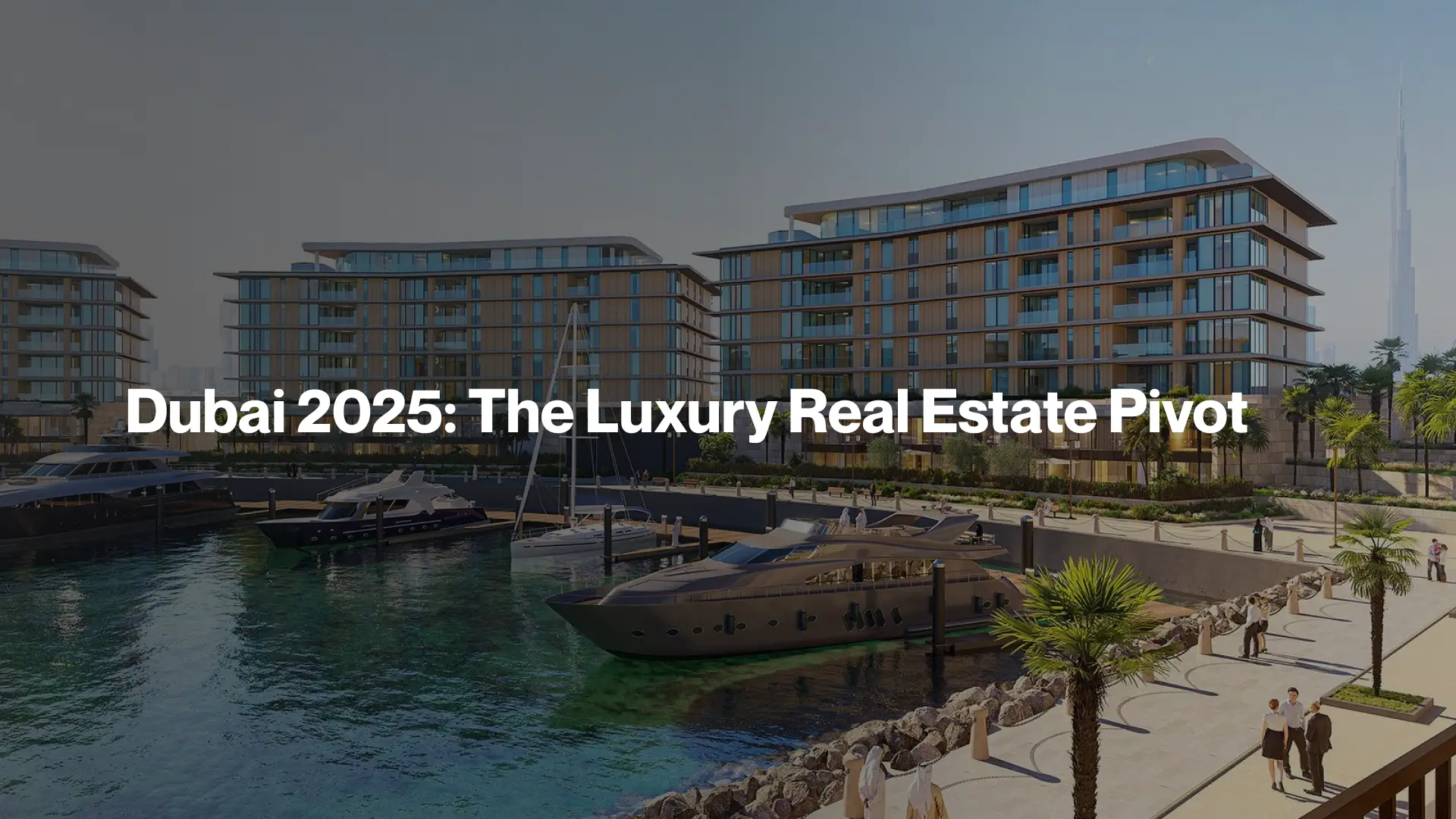
How Smart Investors Are Repositioning Ahead of the Shift
Introduction
Dubai’s real estate market, long known for its record-breaking surges, is entering a new phase in 2025. After years of rapid growth and strong investor sentiment, signs of transition are clear: the market is maturing, supply is building, and winning strategies will depend less on momentum and more on precision.
April 2025 underlined this shift with historic numbers: AED 62.4 billion in sales, a 95.3% year-on-year increase, across 17,979 transactions — the strongest single month on record.
But that strength isn’t evenly spread. Today’s smart investors are playing defense while targeting specific, high-upside opportunities.
In this article, we break down the data, highlight the inflection zones, and outline how investors can pivot to stay ahead.
1. Market Snapshot: Strength Meets Strain
a. April 2025 — Records with Divergence
The headlines tell a story of strength, but a closer look reveals sharp differences across segments:
-
AED 62.4 billion total transaction value in April 2025 (+95.3% YoY)
-
17,979 transactions (+55% vs April 2024)
-
Segment breakdown:
-
Villas: 3,223 sales worth AED 23.7 billion (+134% volume growth)
-
Plots: 599 transactions worth AED 10.9 billion (+126% volume growth)
-
Apartments (resale + off-plan): 13,737 units worth AED 26.7 billion (+42.3%)
The picture is clear: while demand is rising across the board, villas, plots, and ultra-premium properties are leading the charge, outpacing the apartment segment.
b. Cooling Rentals & Slower Price Growth
Beneath the sales boom, early signs of moderation are visible:
This mounting pipeline will pressure absorption rates, particularly in the mid-tier apartment market
2. Inflection Zones: Where the Market Is Pivoting
a. Luxury & Ultra-Prime Segments Stay Resilient
Ultra-prime areas like Palm Jumeirah, Emirates Hills, and Downtown remain relatively shielded from corrections. Buyers here are less sensitive to price and more focused on prestige, lifestyle, and scarcity.
For example, Emirates Hills plots fetch AED 2,000–3,000 per sq ft, with exceptional sites pushing beyond AED 4,500. Even in a downturn, these enclaves tend to hold value better.
b. Growth Corridors & Edge Communities
Emerging zones such as Dubai South, Dubailand, and Ras Al Khor are gaining traction thanks to:
These are the markets where investors can reposition with less downside risk and more appreciation potential.
c. Flipping Faces Headwinds
The quick “buy and flip” strategy that fueled much of the resale market is showing cracks. With more volatility, rising financing costs, and delivery delays, speculative flips are riskier.
Fitch forecasts a price correction of up to 15% by late 2025–2026, largely tied to oversupply. Flipping-heavy zones may see sharper corrections.
d. Delivery Risk in Certain Projects
Projects with construction delays, backlog issues, or weak transparency are becoming higher risk, regardless of location. Only developments backed by credible developers, escrow protection, and consistent delivery should be prioritized.
3. Pivot Strategies for Smart Investors
Here’s how to adapt to the 2025 market shift:
| Strategy |
Objective |
Tactics |
| Defense First |
Protect against downturns |
Keep 30–40% in ultra-prime zones, avoid overexposure to speculative mid-tier towers |
| Selective Corridor Plays |
Capture asymmetric upside |
Enter edge markets with strong infrastructure plans; confirm exit strategies |
| Staged Entry |
Reduce upfront exposure |
Opt for staggered purchases or phased closings |
| Ready / Near-Ready Assets |
Avoid construction risk |
Favor resale-ready or nearly completed projects |
| Hybrid Use |
Combine income & appreciation |
Mix long-term holds with short-term or luxury rentals |
| Due Diligence Discipline |
Minimize hidden risks |
Check escrow accounts, developer track record, bank support |
| Liquidity Buffer |
Maintain flexibility |
Avoid over-leverage, secure financing with flexibility |
These aren’t speculative plays — they mirror what seasoned global investors are already doing.
4. Key Risks & Red Flags
-
Oversupply vs absorption mismatch in mid-tier apartments
-
Interest rate pressure reducing mortgage capacity
-
Delivery delays or quality issues leading to steep discounts
-
Liquidity crunch narrowing exit opportunities
-
“Mass luxury” projects caught between mid-market and true premium
Smart investors will monitor these closely, adjusting portfolios early.
5. Forward Look (2026–2028): Scenarios to Watch
Scenarios
-
Base Case: 5–10% correction in broader market; luxury holds steady
-
Upside: Infrastructure growth + foreign inflows sustain pricing in key corridors
-
Downside: 15%+ correction if global shocks hit; speculative and mid-tier segments hardest hit
Key Metrics
-
Monthly transaction data from DXBinteract
-
Deliveries vs absorption rates
-
Pricing by district and asset class
-
Interest rate trends and mortgage approvals
-
Developer leverage and project backlog health
Investors should track these leading indicators to spot opportunities early.
Conclusion
Dubai’s property market in 2025 is still delivering record highs, but the playing field is shifting. The next phase won’t be about chasing momentum — it’s about positioning with precision.
Smart investors are already tilting toward premium zones, resilient edge communities, and projects with reliable delivery records. They’re reducing exposure to speculative flips, keeping liquidity buffers, and preparing for the moderate correction global analysts have flagged.
In the end, the winners of Dubai’s 2025 pivot will be those who don’t just buy property, but who understand the structural shifts shaping the next cycle.
📢 Stay ahead of Dubai’s 2025 real estate pivot.
Join our official Telegram channel for daily market updates, new project launches, and exclusive insights you won’t find anywhere else.